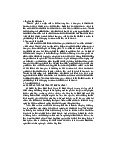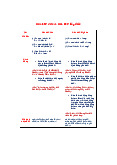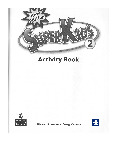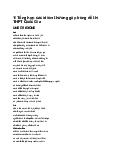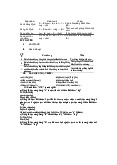







Preview text:
A. Demographic Information:
A.1 Student Name…………………..
A.2 Student ID:................................
A.3 Student Major:..........................
A.4 Student Gender:.......................
A.5 Student Age:...........................
B. Students’ own knowledge and practice of autonomy
Commented [1]: ở trên slide ko có phần này, ớ v i ạ l i tui
nói là likert scale từ strongly disagree đến strongly
B.1 How would you rate your understanding of the concept of learner autonomy?
agree, nên là mấy option khác phải giải thích á. Chắc
☐ Excellent ☐ Good ☐ Average ☐ Poor ☐ No understanding tạm t ờ
h i khoan để phần này dô mock defense
B.2 To what extent do you consider yourself an autonomous learner?
Commented [2]: cnay là câu hỏi khảo sát thêm thôi để biết thông tin ề
n n của học sinhas. Bản chất cnay cũng
☐ To a great extent ☐ To a moderate extent ☐ To some extent ☐ To a little extent ☐ Not at là Likert á all
B.3 How often do you set your own learning goals?
☐ Always ☐ Often ☐ Sometimes ☐ Rarely ☐ Never
B.4 Do you actively seek out additional learning resources beyond what is provided in your
courses? ☐ Yes, frequently ☐ Yes, occasionally ☐ Rarely ☐ Never
B.5 How often do you reflect on your learning progress and make adjustments to your learning strategies?
☐ Always ☐ Often ☐ Sometimes ☐ Rarely ☐ Never
B.6 To what extent do you take responsibility for your own learning?
☐ To a great extent ☐ To a moderate extent ☐ To some extent ☐ To a little extent ☐ Not at all
B.7 Have you received any training or guidance on developing learner autonomy?
☐ Always ☐ Often ☐ Sometimes ☐ Rarely ☐ Never
B.8 How would you rate the overall classroom environment in terms of promoting learner
autonomy? ☐ Excellent ☐ Good ☐ Average ☐ Poor ☐ Very Poor
B.9 To what extent do your instructors encourage you to take responsibility for your own learning?
☐ To a great extent ☐ To a moderate extent ☐ To some extent ☐ To a little extent ☐ Not at all
B.10 Are there sufficient resources (e.g. library, online materials, study spaces) available in
your university to support independent learning?
☐ Yes, more than enough ☐ Yes, adequate ☐ Somewhat adequate ☐ Inadequate ☐ Very inadequate
B.11 How often do you have opportunities to participate in collaborative learning activities
(e.g., group projects, peer discussions) that promote learner autonomy?
☐ Always ☐ Often ☐ Sometimes ☐ Rarely ☐ Never C. Learning Strategies ● Goal-setting:
C.1 Setting specific learning goals helps me take responsibility for my own learning.
☐ Strongly disgree ☐Disagree ☐Neutral ☐ Agree ☐ Strongly Agree
C.2 Setting specific learning goals has improved my time management and study habits.
☐ Strongly disgree ☐Disagree ☐Neutral ☐ Agree ☐ Strongly Agree
C.3 The process of setting specific learning goals helps me stay focused and motivated in my studies.
☐ Strongly disgree ☐Disagree ☐Neutral ☐ Agree ☐ Strongly Agree
● Seeking additional resources:
C.4 Collecting information and knowledge via library, the Internet, etc that is beyond course
materials enhances my understanding of the subject matter.
☐ Strongly disgree ☐Disagree ☐Neutral ☐ Agree ☐ Strongly Agree
C.5 Seeking additional resources outside of the classroom has helped me develop critical thinking and research skills.
☐ Strongly disgree ☐Disagree ☐Neutral ☐ Agree ☐ Strongly Agree
C.6 The abilities to self-evaluate and select relevant additional resources support my learning goals.
☐ Strongly disgree ☐Disagree ☐Neutral ☐ Agree ☐ Strongly Agree
● Reflecting on learning experiences:
C.7 Reflecting on my learning experiences helps me identify my strengths and weaknesses as a learner.
☐ Strongly disgree ☐Disagree ☐Neutral ☐ Agree ☐ Strongly Agree
C.8 Reflecting on my learning experiences has improved my ability to set realistic and achievable learning goals.
☐ Strongly disgree ☐Disagree ☐Neutral ☐ Agree ☐ Strongly Agree
C.9 The process of reflecting on my learning experiences encourages me to take ownership of my learning journey.
☐ Strongly disgree ☐Disagree ☐Neutral ☐ Agree ☐ Strongly Agree
● Collaborating with peers:
C.10 Collaborating with peers and engaging in group discussions promotes my ability to learn independently.
☐ Strongly disgree ☐Disagree ☐Neutral ☐ Agree ☐ Strongly Agree
C.11 Peer feedback helps me identify strengths and weaknesses in my learning.
☐ Strongly disgree ☐Disagree ☐Neutral ☐ Agree ☐ Strongly Agree
C.12 Explaining concepts to others solidifies my own understanding.
☐ Strongly disgree ☐Disagree ☐Neutral ☐ Agree ☐ Strongly Agree ● Time management:
C.13 Organizing and managing my study time effectively allows me to take control of my learning process.
☐ Strongly disgree ☐Disagree ☐Neutral ☐ Agree ☐ Strongly Agree
C.14 Setting realistic goals and deadlines helps me stay focused on my learning objectives.
☐ Strongly disgree ☐Disagree ☐Neutral ☐ Agree ☐ Strongly Agree
C.15 Prioritizing tasks effectively enables me to make the most of my study time.
☐ Strongly disgree ☐Disagree ☐Neutral ☐ Agree ☐ Strongly Agree ● Seeking feedback:
C.16 Seeking feedback from instructors and peers helps me monitor my progress and identify areas for development.
☐ Strongly disgree ☐Disagree ☐Neutral ☐ Agree ☐ Strongly Agree
C.17 Receiving constructive criticism motivates me to improve my learning strategies.
☐ Strongly disgree ☐Disagree ☐Neutral ☐ Agree ☐ Strongly Agree
C.18 Asking clarifying questions helps me understand feedback more thoroughly.
☐ Strongly disgree ☐Disagree ☐Neutral ☐ Agree ☐ Strongly Agree
● Applying various learning strategies (e.g., note-taking, summarizing, mind- mapping):
C.19 Applying various learning strategies (e.g., note-taking, summarizing, mind-mapping)
enhances my ability to learn autonomously.
☐ Strongly disgree ☐Disagree ☐Neutral ☐ Agree ☐ Strongly Agree
C.20 Experimenting with different note-taking methods helps me find what works best.
☐ Strongly disgree ☐Disagree ☐Neutral ☐ Agree ☐ Strongly Agree
C.21 Creating visual representations (diagrams, charts, etc.) reinforces my understanding.
☐ Strongly disgree ☐Disagree ☐Neutral ☐ Agree ☐ Strongly Agree ● Self-evaluation:
C.22 Evaluating my learning strengths and weaknesses helps me tailor my learning strategies to suit my needs.
☐ Strongly disgree ☐Disagree ☐Neutral ☐ Agree ☐ Strongly Agree ● Self-assessment:
C.23 Utilizing self-assessment tools (e.g., quizzes, practice tests) enables me to track my understanding and progress.
☐ Strongly disgree ☐Disagree ☐Neutral ☐ Agree ☐ Strongly Agree
● Overall learning strategies:
C.24 Overall, the learning strategies I employ contribute significantly to my ability to learn
independently and take control of my learning experience
☐ Strongly disgree ☐Disagree ☐Neutral ☐ Agree ☐ Strongly Agree D. Learning Environment
● Teaching Methods and Practices:
D.1 The teaching methods used by instructors allow me to make choices about how I learn.
☐ Strongly disgree ☐Disagree ☐Neutral ☐ Agree ☐ Strongly Agree
D.2 Instructors create opportunities for students to take responsibility for their own learning.
☐ Strongly disgree ☐Disagree ☐Neutral ☐ Agree ☐ Strongly Agree
D.3 The teaching practices in my classes encourage me to set personal learning goals.
☐ Strongly disgree ☐Disagree ☐Neutral ☐ Agree ☐ Strongly Agree
● Feedback and Guidance:
D.4 My instructors offer strategies to help me overcome learning challenges independently.
☐ Strongly disgree ☐Disagree ☐Neutral ☐ Agree ☐ Strongly Agree
D.5 I receive constructive feedback from my instructors to support my learning goals.
☐ Strongly disgree ☐Disagree ☐Neutral ☐ Agree ☐ Strongly Agree
D.6 Peer feedback contributes to my development of learner autonomy.
☐ Strongly disgree ☐Disagree ☐Neutral ☐ Agree ☐ Strongly Agree
D.7 I receive feedback that helps me understand my strengths and areas for improvement.
☐ Strongly disgree ☐Disagree ☐Neutral ☐ Agree ☐ Strongly Agree
● Classroom Atmosphere:
D.8 The classroom atmosphere created by instructors encourages students to express their opinions and ideas.
☐ Strongly disgree ☐Disagree ☐Neutral ☐ Agree ☐ Strongly Agree
D.9 The classroom environment encourages open dialogue and the exchange of diverse perspectives.
☐ Strongly disgree ☐Disagree ☐Neutral ☐ Agree ☐ Strongly Agree
D.10 The classroom atmosphere promotes a spirit of collaboration and mutual support.
☐ Strongly disgree ☐Disagree ☐Neutral ☐ Agree ☐ Strongly Agree
D.11 The classroom environment is welcoming and inclusive for all students.
☐ Strongly disgree ☐Disagree ☐Neutral ☐ Agree ☐ Strongly Agree ● Peer interactions:
D.12 Instructors design activities that promote collaboration and peer learning.
☐ Strongly disgree ☐Disagree ☐Neutral ☐ Agree ☐ Strongly Agree
D.13 Interactions with my peers motivate me to take charge of my learning process.
☐ Strongly disgree ☐Disagree ☐Neutral ☐ Agree ☐ Strongly Agree
D.14 Group discussions and peer feedback enhance my ability to learn independently.
☐ Strongly disgree ☐Disagree ☐Neutral ☐ Agree ☐ Strongly Agree
D.15 Working with peers exposes me to different problem-solving approaches.
☐ Strongly disgree ☐Disagree ☐Neutral ☐ Agree ☐ Strongly Agree
● Effects of Peer Pressure:
D.16 The pressure or expectations from my peers influence my motivation to learn independently.
☐ Strongly disgree ☐Disagree ☐Neutral ☐ Agree ☐ Strongly Agree
D.17 I feel pressured by my peers to conform to certain learning behaviors or styles.
☐ Strongly disgree ☐Disagree ☐Neutral ☐ Agree ☐ Strongly Agree
D.18 Peer expectations sometimes cause me to prioritize activities other than independent learning.
☐ Strongly disgree ☐Disagree ☐Neutral ☐ Agree ☐ Strongly Agree
Instructor-student relationship:
D.19 The relationship between instructors and students is supportive and promotes learner autonomy.
☐ Strongly disgree ☐Disagree ☐Neutral ☐ Agree ☐ Strongly Agree
D.20 Instructors provide personalized guidance and support to help students develop self- directed learning skills.
☐ Strongly disgree ☐Disagree ☐Neutral ☐ Agree ☐ Strongly Agree
D.21 Instructors serve as role models for lifelong learning and intellectual curiosity.
☐ Strongly disgree ☐Disagree ☐Neutral ☐ Agree ☐ Strongly Agree
● Overall learning environment:
D.22 The energetic atmosphere in the classroom encourages me to explore different
perspectives and learning styles.
☐ Strongly disgree ☐Disagree ☐Neutral ☐ Agree ☐ Strongly Agree
D.23 The overall learning environment fostered by instructors and peers at USSH empowers
me to take control of my learning process.
☐ Strongly disgree ☐Disagree ☐Neutral ☐ Agree ☐ Strongly Agree
D.24 I feel empowered to make decisions about
☐ Strongly disgree ☐Disagree ☐Neutral ☐ Agree ☐ Strongly Agree Main themes Subsections Items
Demographic information Student Name, ID, Major, A.1 → A.5 Gender, Age Understanding B.1 Self-assessment Self-assessment of being an B.2 autonomous learner Goal-setting practice B.3
Students’ self-evaluation of their Seeking additional learning B.4 own autonomy ability resources practices
Reflecting on learning progress B.5 and adjusting strategies Taking responsibility for B.6 learning B.7 Training or guidance received on developing learner autonomy B.8 → B.11 Students' evaluation of the classroom/institutional environment in promoting learner autonomy Goal-setting C.1 → C.3 Seeking additional resource C.4 → C.6 Reflecting on learning C.7 → C.9 experiences: Collaborating with peers C.10 → C.12 Learning Time management C.13 → C.15 Strategies Seeking feedback C.16 → C.18 The Influences of the Applying various learning C.19 → C.21 learning
strategies (e.g., note-taking, environment and summarizing, mind-mapping) learning strategies on learner autonomy. Self-evaluation C.22 Self-assessment C.23 Overall learning strategies C.24 Teaching Methods and D.1 → D.3 Practices Feedback and Guidance D.4 → D.7 Classroom Atmosphere D.8 → D.11 Learning Environmen Peer interactions D.12 → D.15 t Effects of Peer Pressure D.16 → D.18
Instructor-student relationship D.19 → D.21 Overall learning environment D.22 → D.24 TIMETABLE:
Phase 1: Preparation (2 months)
- Week 1-2: Conduct a comprehensive literature review on learner autonomy, learning
environments, learning strategies, and relevant theoretical frameworks.
- Week 3-4: Develop research instruments (surveys, interview protocols) aligned with research objectives.
- Week 5-6: Obtain necessary approvals from the institution (USSH) and ethical review board.
- Week 7-8: Pilot test research instruments and make necessary revisions.
Phase 2: Data Collection (4 months)
- Week 1-4: Administer surveys to a representative sample of first-year students at USSH.
- Week 5-12: Conduct semi-structured interviews with a subset of first-year students.
- Week 13-16: Transcribe interview recordings and organize collected data.
Phase 3: Data Analysis (3 months)
- Week 1-4: Perform quantitative analysis of survey data (descriptive statistics, correlations, regressions).
- Week 5-8: Conduct qualitative analysis of interview data (coding, thematic analysis).
- Week 9-12: Triangulate and integrate quantitative and qualitative findings.
Phase 4: Reporting (2 months)
- Week 1-6: Interpret findings within the theoretical framework and existing literature.
- Week 7-8: Write a research report, including introduction, methodology, results, discussion, and conclusions.
Phase 5: Dissemination (1 month)
- Week 1-2: Prepare research presentations and publications.
- Week 3-4: Present findings at relevant conferences or institutional events.
RESOURCE: In terms of the resource, there are no constraints that appear to be the barrier
for our study. The data collecting method and data sampling is, although, time-consuming
and effort-consuming, not financially problematic. The given money will be spent on a small
amount to give to those participating in the post-interview session (50.000 VND per interviewee)
